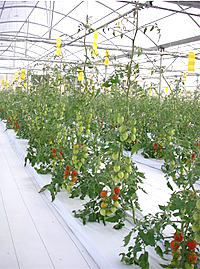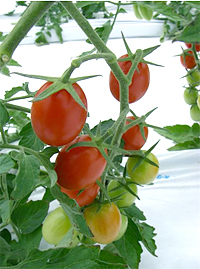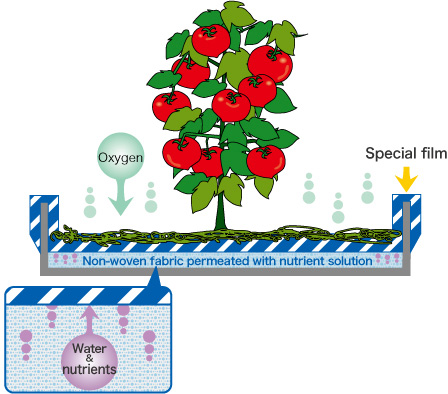Sojitz Cultivating Top-Grade Tomatoes in the Desert
- Trial Project Aimed at Commercial Application Begins in the UAE -
May 14, 2009
Sojitz Corporation has launched a full-scale project in the United Arab Emirates (UAE) aimed at commercializing agricultural production based on an original cultivation technology. The growing method being advanced in this undertaking is focused on the laying of a specialized film-consistency sheet on the ground surface, which supports cultivation of vegetables in the total absence of soil and with only trace use of water. The goal is to popularize the new approach in the Middle East, a region of the world sorely lacking in water resources.
Working jointly with the Al Ghurair Group (a leading financial conglomerate in the UAE) and Mebiol Inc. (headquartered in Hiratsuka City, Kanagawa Prefecture; Yuichi Mori, President), a biotechnology business venture financed directly by Waseda University of Japa, Sojitz has been advancing trial cultivation of tomatoes through this technology in Sharjah (one of the seven emirate states contained in the UAE) since this January. Working on experimental facilities within the hot, dry and extremely low rainfall UAE climate, the trial program has succeeded in growing superior quality tomatoes with high sugar content.


[ Trial grown tomatoes ]

[ Cultivation System ]
The breakthrough plant growing system developed by Mebiol uses the special film to separate the plants and nutrient solution in the cultivation process. The film is created from gel instilled with water-retention capacity, while the cultivation process advanced by having only the water and nutrients absorbed from the nutrient solution supplied directly to the plant roots. The plants then strive to absorb the water and nutrients present in the film, generating growth of a massive number of fine hair-like roots that cling to the film surface. To heighten absorption of the nutrient solution, furthermore, the plants produce large amounts of sugar, amino acids and other substances, leading to top-quality tomatoes with high sugar content.
Because the traditional practice in the Middle East is to pump up groundwater or desalinate seawater for use in cultivating crops, lowering production costs has always been a key theme. Besides this, with crop growing focused on the oasis regions where agricultural water can be obtained, it has proved difficult to expand cultivatable land with conventional growing methods. Armed with this new technology, however, it will be possible to strictly control the amount of water in use, while also eliminating the need for the type of elaborate equipment utilized in standard hydroponics. The bottom line, therefore, is the key to easier and more effective agricultural production in desert regions and other areas poor in water resources.
Sojitz plans to collaborate with the Al Ghurair Group to initially pioneer demand for these high sugar content tomatoes among the affluent classes in the UAE (a segment accounting for about 20% of the population), upscale hotels, restaurants and other promising targets, while studying the shift to a production business rooted in the pursuit of economic viability. The vision for future development includes business expansion to other countries in the Middle East and Africa as well.
